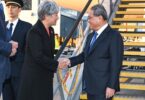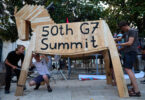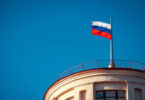It should not be taken as a coincidence that those trying to pour dirty water on the BRICS Foreign Ministers’ Meeting in the Russian city of Nizhny Novgorod on Monday and Tuesday are also those that are responsible for the challenges the participants of the meeting tried to resolve. The club of wealthy nations that has steered the world into dangerous waters has no reason to not refrain from trying to undermine BRICS, and the rise of the Global South as a whole.
This is the first foreign ministers’ meeting of the expanded BRICS, which now consists of Brazil, Russia, India, China, South Africa, Iran, Egypt, Ethiopia, Saudi Arabia and the United Arab Emirates. Given the wide representativeness of these countries, not to mention their close interaction and cooperation with the West, it is ridiculous that there are people trying to politicize and even smear the BRICS meeting as an anti-West gathering.
Those daunted by the rise of the Global South should put aside their pride and prejudice, and be realistic about the true picture of today’s fast-evolving world. They need to objectively see that BRICS is representative of the increasingly important roles the emerging market economies and developing countries are assuming in world affairs. The BRICS countries are playing an indispensable role in promoting common development among the economies of the Global South and fostering fairer multilateral global governance.
The joint declaration issued after the BRICS meeting on Tuesday is the latest testimony to the members’ shared commitment in that regard. BRICS is not a geopolitical tool of any party, nor does it target any third party. It represents a new type of multilateral cooperation mechanism that is open and inclusive. Although there are divergences among the BRICS members on some issues, they all uphold BRICS’ original aspiration of openness, inclusiveness, and win-win cooperation, and share a willingness to resolve their differences through dialogue. That BRICS has expanded from its original four members in 2009 to its current size, with more countries seeking accession to it, reflects the historical trend toward a multipolar world and more equitable international order. The BRICS countries’ common calls for adherence to multilateralism, reform of the international financial architecture, fairer and more effective global governance, touch upon some of the core issues that need addressing. More importantly, the BRICS countries are trying to transform those calls into concrete actions for the common good of the world. As Chinese Foreign Minister Wang Yi noted in his speech at the meeting, the profound changes that are underway in the world raise two questions that need to be answered: How can new opportunities be created amidst the changes? And how can new opportunities be fostered amidst the crisis? For China, the answers to both these questions are unity, development and fairer global governance. All countries should make development their priority and pursue more robust, greener and more balanced global development, Wang said. Dialogue, not division, is the solution.
While we live in a time of turbulence and confusion, it is also a time of renewal. But history has many lessons to offer of the disastrous consequences that arise when the wrong choices are made at such times by those who put themselves before the common good.
The BRICS countries have always stood together, and the expanded membership of the group shows that it stands as a testament to the solidarity of the Global South. The dark clouds, seeded by a few countries, will not last forever. And as the rays of light from the BRICS meeting show, a brighter future lies ahead.







